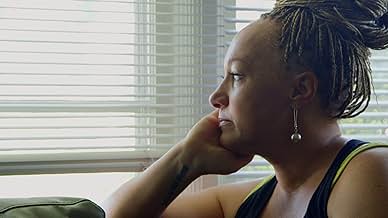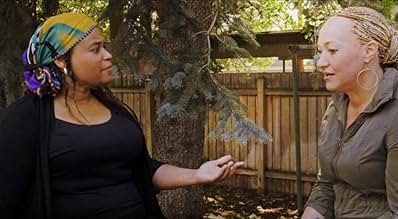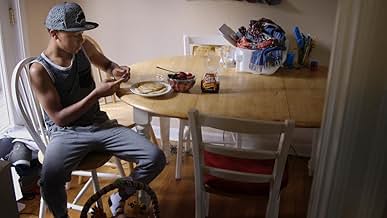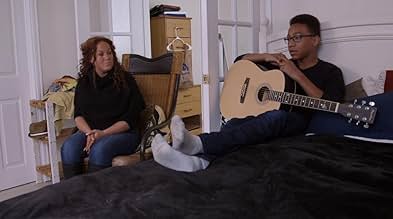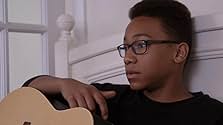IMDb रेटिंग
6.3/10
2.8 हज़ार
आपकी रेटिंग
अपनी भाषा में प्लॉट जोड़ेंRachel Dolezal becomes a social phenomenon when she passes herself off as an African American and becomes the head of her local N.A.A.C.P. chapter.Rachel Dolezal becomes a social phenomenon when she passes herself off as an African American and becomes the head of her local N.A.A.C.P. chapter.Rachel Dolezal becomes a social phenomenon when she passes herself off as an African American and becomes the head of her local N.A.A.C.P. chapter.
- निर्देशक
- लेखक
- स्टार
- पुरस्कार
- कुल 1 नामांकन
Vanessa Bayer
- Self
- (आर्काइव फ़ूटेज)
Tamar Braxton
- Self
- (आर्काइव फ़ूटेज)
फ़ीचर्ड समीक्षाएं
Poor thing is addicted to persecution and keeps seeking it out. I feel really bad for her black teenage sons who she keeps dragging through it.
I'm from Belgium, so I never really experienced the scandal as Americans did. I can vaguely remember that it even made the newspapers here. I must have read this article years ago. When I opened Netflix I recognized Rachel. So I started watching.
This documentary was actually better than I thought it would be. The main focus is clearly on Rachel herself, and how this scandal affects her children, family and in general her whole social life. From the beginning you get the straight feeling that this story is not an easy one to tell. There is no black and white (get it!? ;-) ), with a big lie in between. This is obviously a woman who has been struggling with her identity for many years. You do start to feel she cannot be categorized as a liar. That would just be to simple. I think Rachel does believe that she never really lied. Perhaps she was just really creative with the "truth", so she could continue being the person she loved the most. But when you ignore a certain part of you, it will come back to bite you. That's exactly what happened. Towards the end you do feel Rachel is pushing it. Her family is clearly crumbling, and trying to get away from her. I got the feeling she did see this happening, but just couldn't help herself. Her son was actually quite spot on: "You can't tell my mom what to do". Clearly frustrated. This kid just wishing for life getting back to normal. She's like a dog being hit with a stick and coming back for more. All this for acceptance she will never get.
Being an European I do watch at identity a bit different than most Americans do. And I do feel this woman was born a few decades to early. Whether you like it or not, we've gone from a world to a little village in a few decades. Soon there will be no more "race". So identifying yourself with a certain culture will be a social choice. In that way I think the black community, understandably very hurt about the struggle they already had, made a big mistake here. Instead of demonizing this woman, they could have joined this idea. Making acceptance a universal thing. Not just related to the way you look and your skin color. Isn't this what they have been fighting for? Not being judged on the way you look, but who you are? Equal opportunities? Doesn't that go for a person, who is white but feels black? Or maybe it is just all very black and white. Who am I to say!?
This documentary was actually better than I thought it would be. The main focus is clearly on Rachel herself, and how this scandal affects her children, family and in general her whole social life. From the beginning you get the straight feeling that this story is not an easy one to tell. There is no black and white (get it!? ;-) ), with a big lie in between. This is obviously a woman who has been struggling with her identity for many years. You do start to feel she cannot be categorized as a liar. That would just be to simple. I think Rachel does believe that she never really lied. Perhaps she was just really creative with the "truth", so she could continue being the person she loved the most. But when you ignore a certain part of you, it will come back to bite you. That's exactly what happened. Towards the end you do feel Rachel is pushing it. Her family is clearly crumbling, and trying to get away from her. I got the feeling she did see this happening, but just couldn't help herself. Her son was actually quite spot on: "You can't tell my mom what to do". Clearly frustrated. This kid just wishing for life getting back to normal. She's like a dog being hit with a stick and coming back for more. All this for acceptance she will never get.
Being an European I do watch at identity a bit different than most Americans do. And I do feel this woman was born a few decades to early. Whether you like it or not, we've gone from a world to a little village in a few decades. Soon there will be no more "race". So identifying yourself with a certain culture will be a social choice. In that way I think the black community, understandably very hurt about the struggle they already had, made a big mistake here. Instead of demonizing this woman, they could have joined this idea. Making acceptance a universal thing. Not just related to the way you look and your skin color. Isn't this what they have been fighting for? Not being judged on the way you look, but who you are? Equal opportunities? Doesn't that go for a person, who is white but feels black? Or maybe it is just all very black and white. Who am I to say!?
While Rachel's story is interesting and raises many valid questions about race and identity, the viewer doesn't actually learn much about these topics. As a staple of Netflix documentaries, The Rachel Divide includes virtually no expert opinions or historical background or even contextual information - I would've loved to hear what actual scholars and researchers of race or identity think about this issue! - all we get is Rachel sharing her feelings and long scenes of her doing chores or talking to her family. And then of course a bunch of clips of people angrily reacting to the whole issue.
I think it's a massive missed opportunity and although the ending desperately wants to ask the viewer "well what do you think?" there is almost nothing to base our opinions on.
I think it's a massive missed opportunity and although the ending desperately wants to ask the viewer "well what do you think?" there is almost nothing to base our opinions on.
The media has a way of dehumanising "controversial" characters. It's a decent documentary that offers further insight to the person behind the controversy and hate. Although I wish they would've included a psychological perspective to the main theme of the documentary - racial identity!
As an armchair psychologist, it's clear to me that Rachel is using the less-known notion of "trans-racialism" to disassociate from what seems to have been a difficult childhood and upbringing. In a household where there definitely existed abuse of some type, her escape route was her attachment to her adopted black siblings and wanting to protect them from parents that were unfit to adopt children of a different race. She identified with them more than her own biological parents and brother, all of whom are responsible for inflicting the trauma that she still hasn't addressed or processed.
The form of escapism she chose in order to deal with her domestic issues turned a fantasy of who she wanted to be into a reality where she felt more "authentic" by changing her racial identity. I don't think that at any point, this was a spur-of-the-moment choice to exercise her "white privilege" but something that developed gradually within her at a core-deep level. Many traumatised children do this in one form or another--by creating a new identity for themselves that's the opposite of the identity they were born with or cultivated during a difficult upbringing.
But enough of my amateur psychoanalytical ramblings...
The documentary itself maintained my attention and interest throughout while I experienced quite a roller-coaster of emotions and thoughts, veering between feelings of sympathy for Rachel to getting frustrated with her. Especially heartbreaking was witnessing the pain and anguish her media appearances or social media posts caused her sons, particularly the younger one (who wasn't able to flee to Europe to get away form it all like his older brother). At only 13 years of age, he seemed like an incredibly mature and insightful boy who espoused more common sense and maturity than any of the adults featured.
The horrid nastiness of some of the people towards her was hard to watch. I couldn't compute how they viewed themselves as direct victims of her actions. In a world where hardened criminals like George Floyd are sanctified and made into poster children for justice and celebrated as heroes, what has Rachel done that's so unforgivable/irredeemable that she has to be so vilified and ostracised? People are advocating for transgender rights but why is it okay to be a man who identifies as a woman but not okay to be one race but identify as another? If you are one of the people who believes that race is merely a 'social construct' then you should be supporting Rachel and hail her as a hero for admitting that she's not white despite appearances!
We sure live in a messed-up world where everything has been turned on its head! It might've been helpful if the documentary makers had addressed Rachel's mental health and offered to get her into therapy to deal with many of her unresolved issues.
And finally, so bloody what that she's written a book to tell her side of the story? Considering that no one will employ her, she's excluded from society, harassed when in public etc., she needs to earn money to live and feed her family. Where's the humanity in humans these days? This woman has undeniably made mistakes for which she's paying but at some point we must stop punishing people like her and focus on the real villains of our world.
As an armchair psychologist, it's clear to me that Rachel is using the less-known notion of "trans-racialism" to disassociate from what seems to have been a difficult childhood and upbringing. In a household where there definitely existed abuse of some type, her escape route was her attachment to her adopted black siblings and wanting to protect them from parents that were unfit to adopt children of a different race. She identified with them more than her own biological parents and brother, all of whom are responsible for inflicting the trauma that she still hasn't addressed or processed.
The form of escapism she chose in order to deal with her domestic issues turned a fantasy of who she wanted to be into a reality where she felt more "authentic" by changing her racial identity. I don't think that at any point, this was a spur-of-the-moment choice to exercise her "white privilege" but something that developed gradually within her at a core-deep level. Many traumatised children do this in one form or another--by creating a new identity for themselves that's the opposite of the identity they were born with or cultivated during a difficult upbringing.
But enough of my amateur psychoanalytical ramblings...
The documentary itself maintained my attention and interest throughout while I experienced quite a roller-coaster of emotions and thoughts, veering between feelings of sympathy for Rachel to getting frustrated with her. Especially heartbreaking was witnessing the pain and anguish her media appearances or social media posts caused her sons, particularly the younger one (who wasn't able to flee to Europe to get away form it all like his older brother). At only 13 years of age, he seemed like an incredibly mature and insightful boy who espoused more common sense and maturity than any of the adults featured.
The horrid nastiness of some of the people towards her was hard to watch. I couldn't compute how they viewed themselves as direct victims of her actions. In a world where hardened criminals like George Floyd are sanctified and made into poster children for justice and celebrated as heroes, what has Rachel done that's so unforgivable/irredeemable that she has to be so vilified and ostracised? People are advocating for transgender rights but why is it okay to be a man who identifies as a woman but not okay to be one race but identify as another? If you are one of the people who believes that race is merely a 'social construct' then you should be supporting Rachel and hail her as a hero for admitting that she's not white despite appearances!
We sure live in a messed-up world where everything has been turned on its head! It might've been helpful if the documentary makers had addressed Rachel's mental health and offered to get her into therapy to deal with many of her unresolved issues.
And finally, so bloody what that she's written a book to tell her side of the story? Considering that no one will employ her, she's excluded from society, harassed when in public etc., she needs to earn money to live and feed her family. Where's the humanity in humans these days? This woman has undeniably made mistakes for which she's paying but at some point we must stop punishing people like her and focus on the real villains of our world.
It was interesting to see the back story of someone who would go this far to disassociate themselves from reality. But in a way you can see that she's not fallen as far from the tree as she imagines, the white savior like her parents, adopting black children, just in a different way, fueled by religious fervor of a moral crusade.
Her artistic skill is surprisingly good, its a shame she wasted it to become part of the diversity and grievance industry. But that's the thing this film reveals, she can barely fix her own life let alone anyone elses, a single mother, divorced, saddled with many children, while divorced has another child against the fathers wishes while she has no job. Is she trying to live an ugly stereotype and bring it to life?
The doc does fail to really delve deeper into what she got herself into, the vast infrastructure of the diversity industry. How this nobody became a NAACP branch president, where did they get their money, how was she teaching courses in colleges? The vast flows of money to create these human networks of diversity propagandists is something a netflix doc is never going to deal with, and that's too bad, because it destroys lives, not just Rachels, but those it indoctrinates with the poison of a history and identity of grievance. She might have been a decent artist, maybe even a history teacher, if she had not tried to be what she was not and had spent her time on herself rather than trying to be the white savior.
When she joined the game of identity politics she learned the lesson that the content of her character meant nothing. That is the lesson of her life, and this film.
क्या आपको पता है
- भाव
Franklin: All my mom did is say she was black and people just lost their minds
टॉप पसंद
रेटिंग देने के लिए साइन-इन करें और वैयक्तिकृत सुझावों के लिए वॉचलिस्ट करें
- How long is The Rachel Divide?Alexa द्वारा संचालित
विवरण
- चलने की अवधि
- 1 घं 40 मि(100 min)
- रंग
- पक्ष अनुपात
- 1.85 : 1
इस पेज में योगदान दें
किसी बदलाव का सुझाव दें या अनुपलब्ध कॉन्टेंट जोड़ें


